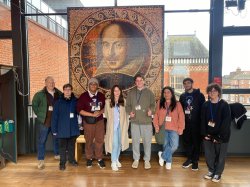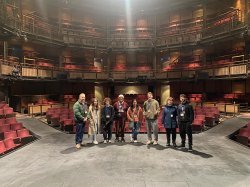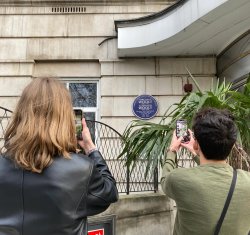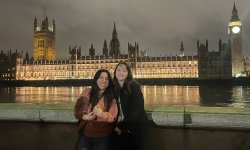Hope for the Future of the Humanities
Montclair students join professors for a faculty-led trip to England
Posted in: English Department, Homepage News and Events

“The changing of the seasons, the cold slicing winds, the falling leaves, sunlight on green grass, snow on the land, London particular. Oh what it is and where it is and why it is, no one knows, but to have said: ‘I walked on Waterloo Bridge,’ ‘I rendezvoused at Charing Cross,’ ‘Piccadilly Circus is my playground,’ to say these things, to have lived these things, to have lived in the great city of London, centre of the world. To one day lean against the wind walking up the Bayswater Road (destination unknown), to see the leaves swirl and dance and spin on the pavement (sight unseeing), to write a casual letter home beginning: ‘Last night, in Trafalgar Square …”
These are the words of Sam Selvon, author of The Lonely Londoners, which the students of ENGL 250 Literary London were assigned to read in anticipation of their study abroad trip, and the passage couldn’t have served as a better prophecy of what was to come. For ten days of their 2024 Spring Break, sixteen Montclair students of various majors traveled to London and Stratford-upon-Avon with their professors, Dr. Jonathan Greenberg and Dr. Lee Behlman, pursuing literature and culture beyond the classroom.
Students followed an itinerary that was centered around their class instruction. Greenberg and Behlman taught pivotal pieces of English literature from classics such as Virginia Woolf’s Mrs. Dalloway, Robert Louis Stevenson’s Dr. Jekyll and Mr. Hyde, and Charles Dickens’s A Christmas Carol to riveting works such as Sam Selvon’s Lonely Londoners and Quentin Crisp’s memoir The Naked Civil Servant.
A tour following Mrs. Dalloway’s day trip allowed students to walk through London and see historic locations such as Buckingham Palace and St. James Park. Similarly, students also toured areas like the East End and Brixton and attended a performance of The Big Life, all of which addressed the rich and complex history of Caribbean immigration and the city’s working class.
The comprehensive education on London was intentional: “We wanted not only to show London represented but also to give a sense of different perspectives over time and from the point of view of different populations and subcultures,” says Greenberg.
Furthermore, the value of art was not limited to the written word. The class attended four performances, three plays and one musical, two of which included Othello at the historic Shakespeare’s Globe and A Midsummer’s Night Dream at the Royal Shakespeare Theater in Shakespeare’s hometown of Stratford-upon-Avon. Students received a backstage tour of the theater and also visited Shakespeare’s home amongst other locations during their two-day excursion in the town.

The daily integration into English literature not only taught students many new things, it also furthered their developing perceptions of the works they’d already studied.
Behlman says, “Having a sense of the geography of London, the look and sounds and feel of places, is indispensable to an understanding of its cultural and literary history. We wanted to give students a sense of pleasure and accomplishment in visiting these new places and connecting them to what they already knew. Ideally, visiting the places enriched their understanding of our texts and reading the texts made those visits more exciting and educational.”
According to junior Matheo Santos, the experience lent him an entirely new perspective on English and the humanities. Having never considered becoming an English major before, Santos was surprised to find himself fully “engaged in the works and dialogue surrounding them.”
He particularly enjoyed visiting the various sites with Greenberg and Behlman: “For those less adept at itinerary planning like myself, having the professors plan a trip and offer their own particular insights on the topics we explored was a unique boon that we would have missed out on if the trip was not faculty-led.”
The opportunity to travel with the class also created bonds that had otherwise not existed. For Santos, those bonds developed between his classmates, professors, and “surprisingly, with locals of the area as well.” Beyond the organized activities, Santos found that most of his favorite memories were made with classmates while wandering the streets and experiencing London’s nightlife in areas not frequented by tourists.
Similarly, fellow classmate Aubrey White, an English major, favored visiting independent bookstores, gathering firsthand how literature is a global experience by seeing locals shopping at the same stores and purchasing the same books as her and her classmates.
Not only was the geographic gap between the Montclair students and Londoners bridged during this time, but so were the divides between generations, the living and the dead, and the fictional and real. White especially noticed how Mrs. Dalloway suddenly became very alive while walking the same path as the titular character.

This got to the very core of the trip’s intention. For Greenberg, students often miss aspects and details of novels because they’ve never been to their settings. The ability to contemplate the art and conversations that took place “in the very neighborhood or even building” where one might be standing completely changes the depth of that appreciation.
For Paloma Lupino, an English major in her senior year, this trip was one she always wanted to venture on: “I had always dreamed of studying London writers…I think it changed my perspective on the world as a whole and it made me realize how much is out there to explore and experience, not only in London, but the entire world.”
Payton Hall, a senior majoring in Psychology and minoring in English, says the experience in England broadened her perspective on a future abroad: “I had such a limited view of the world because I have spent most of my life only in the United States…being on this trip has made me want to see what else is out there.”
Like Santos, Lupino appreciated being able to travel with Greenberg and Behlman, saying, “Going with the professors was beneficial in terms of guidance and recommendations for restaurants and museums to explore. Knowing they had both been to London numerous times put my mind at ease going on this trip for the first time.”
“I did not expect to build such a strong relationship with the professors throughout this trip. Although they were our supervisors, by the end it felt like a big group of friends,” says Lupino.
These newfound friendships and memories are where the lasting effects of Montclair’s 2024 Spring Break trip to England are seen best. Behlman felt lucky to travel with his students, citing their kindness, generosity, and engagement as enriching factors of the experience.

“My favorite part was spending time with the students and seeing London anew through their eyes,” he says. For Behlman, the goal of studying literature and studying abroad is to expand “the understanding of the world and how we’re all connected to it. To draw comparisons with our own cultural contexts and learn to respect others’ all the more. This is at the heart of the humanistic project.”
As for Greenberg, the “‘out of the library’ and ‘out of the classroom’” experiences remind us how the humanities are not “secondary to things like making money or creating a more just society.” Seeing the enthusiasm of his students, many of whom pledged to one another to explore live theater in New York City upon their return to the United States, made him hopeful for the future of literature.
“I was thrilled at the way they all threw themselves into the experience, and sought out experiences on their own above and beyond our scheduled itinerary,” says Greenberg. “Knowing that there are young readers who want to see where Virginia Woolf grew up or who will travel on their own to Freud’s house makes me feel as though our future may be in good hands after all.”
Written by Sarah Ramirez
